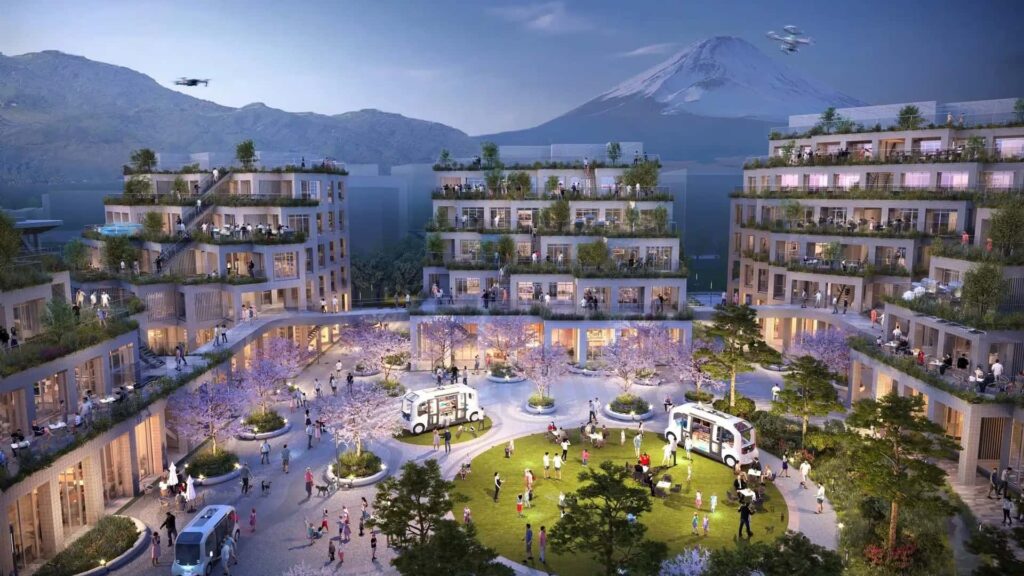One thing is for certain: Toyota is not content with just making cars anymore. The Woven City project represents a bold step towards a future where mobility is not just about vehicles, but about interconnected systems that seamlessly transport people and goods in a sustainable and efficient manner.
The city itself is designed to be a living laboratory, where new technologies can be tested and refined in a real-world environment. From autonomous vehicles to AI-powered infrastructure, the possibilities are endless. And with a scholarship program in place to support startups and innovators, Toyota is inviting the brightest minds to come and shape the future of mobility.
But why Japan, and why now? Toyoda explained that Japan’s aging population and limited land resources make it an ideal testing ground for new mobility solutions. By starting in Japan, Toyota can fine-tune its technologies before scaling them globally. And with the 2025 deadline looming, the pressure is on to deliver results.
Of course, there are skeptics who doubt whether Toyota can truly transform itself into a mobility company. But with billions of dollars invested and a clear roadmap in place, the company is determined to prove them wrong. And with the first phase of the Woven City project completed, the future is looking brighter than ever for Toyota and the future of mobility.
As Toyoda put it, “We are not just building a city, we are building a future. And that future starts now.”
Toyota’s ambitious project, Woven City, is set to revolutionize the development of future technologies in four key areas: energy, mobility, people, and energy. With plans to house up to 2,000 residents, the company envisions a collaborative environment where diverse talents and viewpoints come together to shape a new kind of future.
The sprawling campus, located at the base of Mount Fuji in Japan, spans 175 acres and is dedicated to fostering innovation. While the mountain may only be visible for a few months each year, the vision for Woven City is crystal clear. Toyota is set to kick off the project this summer by accepting applications from companies and individuals seeking financial support to bring their ideas to life.
Already, several prominent companies have signed on as partners to develop technology within Woven City. These include Daikin Industries, Ltd., a leading air-conditioning company, UCC Japan Co. Ltd., a renowned coffee company, and Nissin Food Products, a major player in the instant food industry. John Absmeier, the Chief Technology Officer of Woven by Toyota, revealed that discussions are ongoing with numerous other companies from around the world, with over 6,000 inquiries already received.
The selected partner companies are those looking to reimagine the future of connected cities and the experiences they can offer. One such company specializes in vending machines and is seeking to revolutionize the vending experience within the city. This collaborative approach to innovation and development is what sets Woven City apart, creating a vibrant ecosystem where ideas can flourish and technologies can be brought to life.
Speaking at a news conference, Toyota’s President Akio Toyoda emphasized the importance of bringing together diverse talents and abilities to create a fabric for the future that not only moves people but also moves hearts. With its focus on innovation and collaboration, Woven City is poised to be a hub for cutting-edge technologies that will shape the future of energy, mobility, and people. Urban Coffee Culture (UCC) is always looking for innovative ways to enhance the coffee experience in the city. With the rise of specialty coffee shops and cafes, UCC is thinking about how they can deliver different ways of enjoying food and beverages to their customers.
One of the main focuses for UCC is creating a unique and immersive experience for their customers. This can include everything from the ambiance of the cafe to the presentation of the food and beverages. UCC is constantly exploring new ways to engage all the senses and create a memorable experience for their customers.
One way UCC is thinking about delivering a different coffee experience is by offering interactive workshops and events. These events could include coffee tastings, latte art classes, and even coffee brewing competitions. By engaging with their customers in a hands-on way, UCC can create a deeper connection and appreciation for coffee.
Another idea that UCC is considering is creating a coffee subscription service. This would allow customers to have their favorite coffee beans delivered to their door on a regular basis. Not only does this provide convenience for the customer, but it also allows UCC to showcase different coffee beans and roasts from around the world.
UCC is also thinking about how they can incorporate technology into the coffee experience. This could include a mobile app that allows customers to order ahead, customize their drink, and earn rewards for repeat visits. By leveraging technology, UCC can streamline the ordering process and create a more personalized experience for their customers.
In addition to these ideas, UCC is also exploring the concept of pop-up cafes and collaborations with local artists and chefs. By partnering with other creatives in the city, UCC can offer unique and limited-time experiences that showcase the best of what the city has to offer.
Overall, UCC is committed to pushing the boundaries of what a coffee experience can be. By thinking outside the box and exploring new ideas, UCC is poised to deliver a truly exceptional and memorable experience for their customers. Whether it’s through interactive workshops, subscription services, or collaborations with local artists, UCC is dedicated to creating a coffee experience that is second to none.

